The clock was about to hit 10 a.m. in May 2017. For many, the day was just beginning. But for soldiers in the Second Battalion of the Rapid Reaction Brigade (RRB) within the Kosovo Security Force (KSF), stationed in the “Nato Soldiers” Barracks in Istog, the day had started much earlier — they were about to finish their daily physical training.
Three platoons of 30 soldiers each were positioned around the parade ground of the KSF’s elite Brigade’s main barracks. One was tackling the assault course, another was marching, and the third was undergoing physical training exercises.
The heat of the summer months and the presence of media did not attract the soldiers’ attention. They seemed determined to respect and implement the commands that were being given to them. After completing each exercise successfully, fellow colleagues and commanders applauded them. Motivation is a key aspect for young soldiers, who in the future will represent Kosovo’s army — its Armed Forces.
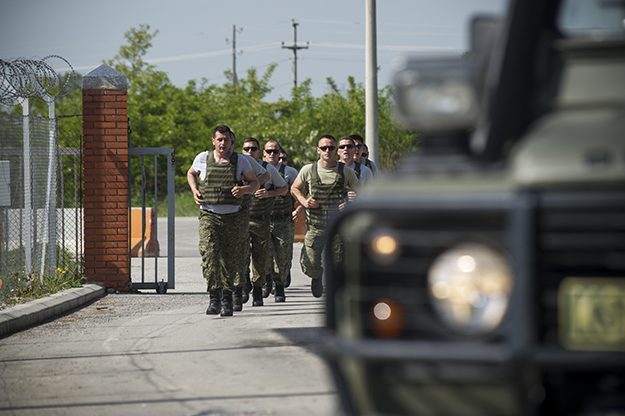
The Rapid Reaction Brigade, pictured here during an exercise in “NATO Soldiers” Barracks in Istog, are the KSF’s elite. Photo: Atdhe Mulla / K2.0.
Twenty-four-year-old Lieutenant Xhevahir Hasanaj looks younger than his colleagues, but is determined in his duties while commanding his subordinates. Now a platoon commander, he is just one of 10 new officers from Kosovo who have studied abroad with the aim of gaining professional experience from ally countries.
On April 13, Hasanaj was chosen as the winner of the prestigious annual Overseas Sword award, as the best international cadet at the British Army’s Royal Military Academy, Sandhurst. As such, he became the second Kosovar soldier to win Sandhurst’s Overseas Sword award, following in the footsteps of Lieutenant Ismail Hoxha in 2015.
Hasanaj speaks proudly of the KSF’s achievements, as he guides K2.0 around the parade ground of the Istog Barracks, which used to belong to Spanish KFOR troops, part of NATO’s mission in Kosovo. Now members of the RRB are demonstrating various exercises.
“The uniform itself is honorable,” Hasanaj says. “There is no higher honor, considering Kosovo’s difficult road to freedom.” He visits the barracks in Istog every day, travelling from Abria e Eperme in Drenas, where he lives. When we ask him what pushes a youngster like him to decide to become a part of the KSF, he replies, “There is no better way to serve the people than by being part of the KSF.”
For Hasanaj, whether or not the KSF will be transformed into an army is of little importance. He feels that it is ready at any moment. “As the KSF we undergo continuous training,” he says. “Military preparation is up to standard. When new changes are made, we’ll be ready to accept them.”
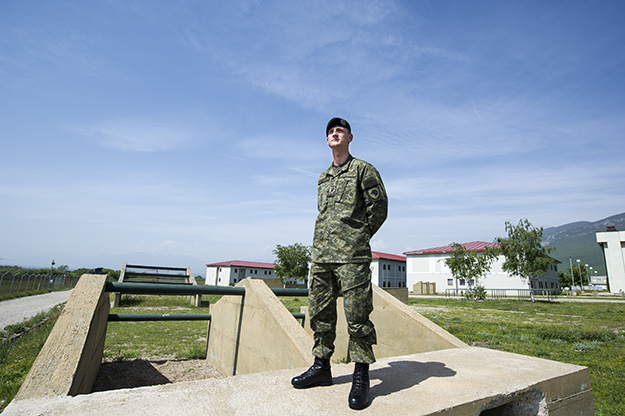
Lieutenant Xhevahir Hasanaj is the second KSF officer to win the Overseas Sword award, given to for best international cadet by the British Army’s Royal Military Academy, Sandhurst. Photo: Atdhe Mulla / K2.0.
A year full of talk
KSF’s readiness to take over the military mandate has seldom been questioned. Although it currently does not have a legal military mandate, since it was established on January 21, 2009 — taking over the competences of the Kosovo Protection Corps (KPC) — it has grown to include 2,500 active members and 800 reserves, all organized in a structure that is similar to that of an army.
Based on the Constitution of Kosovo, namely Article 126, the KSF has the mandate of a national security force, which includes responsibilities such as civil protection operations, mine-clearing and rapid response. It can also take part in international missions, should the need arise. For example, the Search and Rescue Unit of the KSF is one of the most active units abroad and has taken part in search and rescue missions annually during the regular floods in Albania.
An eventual change of mandate from a national security force to a military force would enable the KSF to create new structures and increase the number of its units. This could include, for example, the creation of a military support unit — a combat unit — participation in other international missions such as military missions, establishment of bilateral cooperation with partner countries, further participation in military trainings abroad, and an increased budget and staff numbers, as well as the purchase of heavy armaments, which are currently limited by law.
However, political processes have impeded this step in the past few years, because changing the mandate is only possible through making constitutional amendments, which necessarily require two-thirds of votes in the Kosovo Assembly, and significantly must also include two-thirds of the votes of the 20 minority deputies; the 10 seats reserved for Serb deputies are held by the Belgrade-backed Lista Srpska, which is strongly against the formation of the army.
2017 though has been the year in which the eventual transformation of the KSF has been most discussed, by political and institutional leaders, as well as by international partners. A series of conferences and international visits have been held to discuss the modalities of convincing Serb deputies to vote in favor of constitutional amendments.
The prime issuer of political promises for this transformation has undoubtedly been the supreme commander of the KSF, President Hashim Thaci.
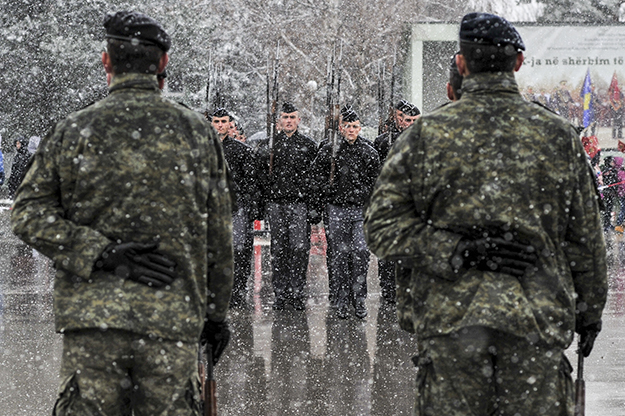
Every year on Nov. 27, KSF celebrates The Day of the Force in honor of its establishment. It hosts citizens and politicians, hoping to one day celebrate the transformation of the Force into the Army. Photo: Atdhe Mulla / K2.0.
In March, Thaci announced in a press conference that he would evade constitutional amendments for transforming the KSF into an army by passing a new law for the KSF, and on March 7 he submitted the Draft Law on the Kosovo Security Force to the Assembly.
His initiative for transforming the KSF was considered by many as an individual initiative due to the lack of preceding consultation with the political parties that are represented in the Assembly. However, the political parties in government and opposition generally stated that they would support Thaci’s bill, for the sake of the process of transforming the KSF’s mandate.
But then on May 10, the Kosovo Assembly was dissolved and snap parliamentary elections were scheduled, thereby bring the bill back to square one. This means that it must now be proceeded again by the president in order for the Assembly to vote on it, and he has indicated that he will not be doing this for the time being.
However, in the meantime, Thaci’s proposal prompted many reactions by Kosovo’s international partners, such as the U.S., the U.K. and officials from NATO, which oversees security in Kosovo. They have continuously insisted that the transformation of the KSF’s mandate must be done only through constitutional changes.
The U.S. stance on this issue was made clear by U.S. Deputy Assistant Secretary for European and Eurasian Affairs Hoyt Brian Yee, who visited Kosovo twice this year. During his visit to Prishtina on March 29, he urged Kosovar leaders not to approve the bill.
“We would want the government to take a step back and retract the bill,” Yee said in an interview with RTK.
During her recent visit to Kosovo on October 27, the deputy secretary general of NATO, Rose Gottemoeller, held a series of closed door meetings about the KSF with President Thaci, the newly appointed minister of the KSF, Rrustem Berisha, and ambassadors from NATO and partner countries.
In a press conference, she reiterated the statement that had been made by NATO General Secretary Jens Stoltenberg during his visit to Kosovo in February.
“The transformation of the Kosovo Security Force is an issue which must be decided by Kosovar authorities — it is a Kosovar issue. But on the other hand, it is outstandingly important that this transformation be done in full accordance with constitutional procedures,” Gottemoeller said. “I really want to highlight and underline this message again.”
KSF’s political team
On December 5 the stage was set in the main hall of the “Adem Jashari” Barracks, the central command of the Kosovo Security Force in Prishtina. It was there that the supreme commander, President Hashim Thaci, had decided to hold his final speech of the year by addressing citizens in the military barracks, with rows of soldiers positioned behind him. Thaci again highlighted the “urgent need to rebuild national consensus for issues of state interest.”
“Our citizens want to see their chosen political leaders united when it comes to issues of state interest. Kosovo’s citizens are an autochthonous European people, thus our future, including the values we represent, is naturally and securely in accordance with the European Union, NATO and the UN,” said Thaci, before going on to reiterate that he would not wait long before continuing with his initiative to transform the KSF’s mandate.
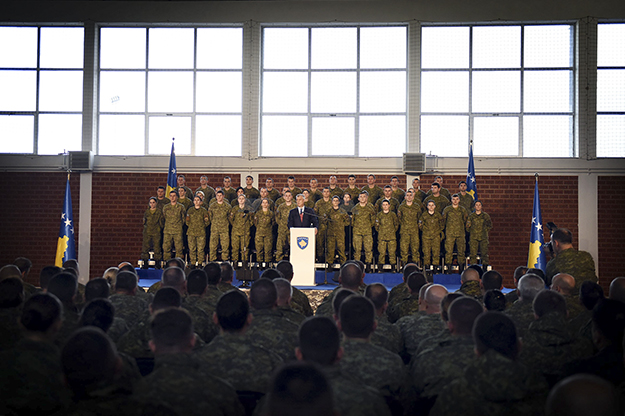
President Hashim Thaci insists that the transformation of the KSF into the army will happen soon, with or without the votes of Serbian deputies. Photo courtesy of the Office of the President.
In fact, it was the president himself that had decided to suspend the bill after the many reactions that had come as a result of his attempt to ignore the constitutional changes route. He also decided to take further steps to convince Serbs to vote in favor of constitutional amendments. His media official, Artan Behrami, told K2.0 that Thaci has established a political “unity team,” through which he is coordinating work for guaranteeing the constitutional amendments, but did not reveal the members of this team.
“This team is coordinating all necessary activities with every respective structure within the country and abroad. Its aim is to achieve general consensus for changing and amending the Constitution of Kosovo, which would open the way for transforming the KSF into the Kosovo Army,” Behrami said.
Behrami also said that the new bill for the KSF had been suspended only temporarily, as per the president’s request, with the objective of exhausting all other options for including all communities in this process, especially Serbs, without whom the establishment of the army through constitutional changes is impossible.
“This means that if we are convinced that the deputies of Lista Srpska are deliberately impeding attempts to change the KSF’s name and mandate through constitutional amendments, then we will be forced to do this through a new law. This is it. Everything is clear,” Behrami said.
K2.0 asked Srpska Lista deputy Slavko Simic whether or not they have held meetings with the leadership about the issue of amending the Constitution so as to enable the transformation of KSF’s mandate, and whether or not his party would vote in favor of it. However, he did not respond to our questions.
On the other hand, Belgrade officials, who influence Lista Srpska, have made it clear that they would impede the creation of the Kosovo Army by any means.
Back in February, the foreign minister of Serbia, Ivica Dacic, reacted to statements made by Thaci about urgently establishing the army — ahead of the Kosovo president’s announcement on transferring the KSF through a change in the law — by saying that he could not do this without securing the votes of Lista Srpska deputies. “They have no right to create such forces in accordance with [UN Security Council] Resolution 1244. Such a decision is illegal. The only armed forces that can exist in Kosovo and Metohija are KFOR,” he said.
In fact, the dilemma regarding recognition and expansion of Kosovo’s army across the whole state’s territory is dealt with through three international agreements. Most recently, in 2013, Kosovo’s government signed an agreement with Serbia in Brussels that prevents the KSF from entering the north of the country without first obtaining NATO permission.
But Kosovo also accepted the other two international agreements before declaring independence: UN Security Council Resolution 1244 and the Kumanova Military Technical Agreement, both of which were signed at the end of the war in 1999 and do not recognize any other defense or military force in Kosovo besides NATO forces.
Obstacle to the integration of Serbs
Political leaders trying to convince Serb deputies on the merits of the Kosovo army are not the only ones attempting to achieve progress in integrating Serbs on this issue. The media office of the Ministry of the Kosovo Security Force (MKSF) told K2.0 that in the last two years they have implemented three recruitment campaigns, two for the recruitment of the following year’s new cadets and one — dedicated solely to minority communities — for the recruitment of active members, which includes soldiers that immediately start working for the KSF after the recruitment process.
KSF’s first Serb members were recruited upon its establishment in 2009. Three members were accepted, two men and one woman. They had also been part of the KPC, the civilian emergency services organization that served as the precursor to the KSF. “These three members started serving in the First Battalion of the Rapid Reaction Brigade in Gjilan,” Ibrahim Shala, director of the communications department of MKSF, told K2.0.
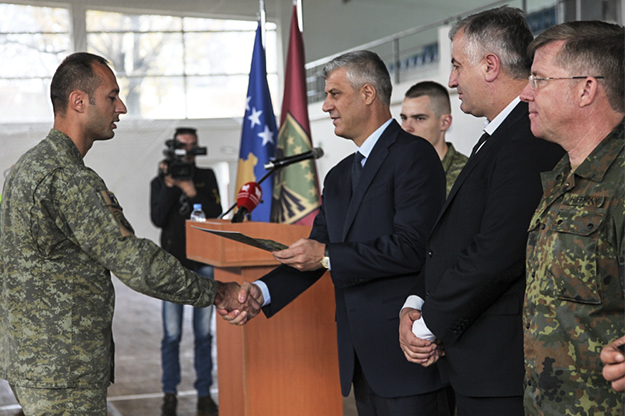
In November, as part of efforts to demonstrate equal inclusion of all communities within the KSF, President Thaci promoted a number of KSF members from the Serb community. Photo courtesy of MKSF.
In the cadet recruitment campaign in 2016, 13 candidates from minority communities applied, from which one was a Serb. This year, 14 minority candidates applied, none of whom were Serbs.
But during this year’s campaign aimed specifically at minority communities for the immediate employment of active KSF members, according to Shala, from 91 minority candidates that applied 88 were Serbs and 3 were Montenegrins. The total number of Serb soldiers in the KSF is now 103.
However, data provided by Shala shows that most Serb KSF members come from Kosovo’s south and only three come from the north, specifically from Zubin Potok in the Mitrovica region.
It has not been at all easy for them to integrate in the KSF. All three were accepted in September and since then they have been subject to two grenade attacks, for which the police have made no arrests.
Two of these three KSF members who serve in the Mitrovica Command, Bojan Radishevic and Dushan Tomovic, were attacked for the second time with grenades in their homes in late November. The police investigated the cases and determined that the attacks resulted in material damage. According to the Kosovo Police, suspects are still at large and no official motive of the attack has been given.
Kosovo’s prime minister, Ramush Haradinaj, condemned the attacks, highlighting that it is “an unacceptable act that endangers the lives of citizens and has an objective of impeding attempts to build a democratic society.” President Thaci also reacted, describing the act as an impediment to the integration of Kosovar Serbs in the KSF.
K2.0 requested to interview the two members who were subject to attacks, however, due to security issues, the ministry did not issue a permit.
Despite the political issues that have arisen as barriers to transforming the its mandate, and despite what is deemed by security experts as an insufficient budget — just over 51 million euros were allocated this year — with the help of its partners, in 2017 the KSF has managed to strengthen its professional capacities in terms of personnel development.
One thing is clear: the KSF seems to be highly valued by a large proportion of the population. According to research by the Kosovo Center for Security Studies, just over 70 percent of Kosovo’s population lists the KSF as the second most trusted institution in the country, after the fire brigade, and 87 percent support its transformation into Kosovo’s army.
It is difficult for anyone to estimate when this transformation will happen for sure. Although the president has proclaimed that 2018 will be the year this will happen, just as he did so about 2017 a year ago. But it is clear that pledges made by politicians like Thaci — who appears not to have a concrete plan for ensuring the votes of Serb representatives for establishing the army — have to date been little more than empty political promises.K

